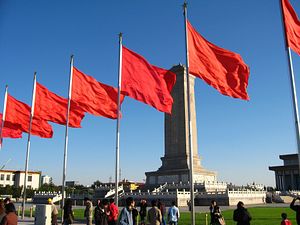The China-United States bilateral relationship — the most consequential bilateral in the world — has always received much global attention, particularly as the world is undergoing a structural transformation amid significant domestic transformations in both countries. In light of this, it is not surprising that strategists in both countries seek to develop new approaches and frameworks to cope with these changing new realities.
In recent weeks, though, a flurry of major policy essays (see here, here, and here) coming out of Washington circles seem to pour cold water on the future of the U.S.-China relationship. Indeed, one finds chilling words in all three essays such as “reckoning,” “post-engagement,” “illusions,” et cetera.
All three essays agree on one important point: the past 40 years of U.S. China policy, centered around engagement, turned out to be ineffective in dealing with an increasingly powerful and active China, hence a new China policy is much-needed to meet the China challenge. Although none of the essays openly advocates for a Cold War-style containment policy toward China, the implied message is that a much sharper response to China’s ambitions and behaviors will likely ensure America’s global interests and position. This message, along with the main theme that “great power competition” is back, per the 2017 U.S. National Security Strategy, seems to suggest that a fundamental shift in U.S. China policy is already underway.
Needless to say, this shift, if true, is huge for the U.S.-China relationship. As always, there are also debates over whether such a reckoning is really needed, as recent debates at China File make clear. Some analysts believe such a reckoning or a fundamental shift is unnecessary and could even be counterproductive, and others argue that more cautious policies must be adopted when competing with China, as competition might easily turn into confrontation.
Despite such disagreement among U.S. analysts themselves, the fundamental shift in the U.S.-China relationship seems clear: we’ll see competition dominate the U.S.-China relationship in coming years, with limited cooperation. This is not entirely surprising, though. Both structural forces at the global level and domestic politics factors in China and the United States have slowly but surely pointed to this outcome over the last ten years, particularly since the global financial crisis in 2007-2009. China has seemed to abandoned its long-held policy geared toward keeping a low profile, especially when the Chinese Communist Party declared that the country had entered a new era of socialist construction in October 2017.
Going forward, there are three things both China and the United States can do to help maintain healthy competition and avoid confrontation. Regional instability and serious conflict could arise if these three things are not done.
First, both sides must exercise self-restraint. This is critical as states live in an anarchical environment, which tends to breed distrust and misperception between states. The security dilemma makes things worse as it pushes states to interpret defensive moves by the other side as offensive ones. And this is already happening in U.S.-China relations, as China tends to believe the United States seeks to block China’s rise and Washington believes Beijing seeks to displace the U.S. in Asia. Self-restraint, especially during periods of heightened tensions, can help make room for rational and cool thinking to prevail.
Second, both sides must communicate more. It cannot be stressed enough how important effective communications can be during tensions and even crises. The current four high-level dialogue mechanisms between the United States and China were designed to facilitate mutual understanding between the two, but unfortunately some of them have been stalled due to a lack of progress. This is short-sighted, because merely sitting down together and talking about each other’s concerns and seeking solutions can be beneficial, even without clear progress. Speculating about each other’s plans and intentions certainly will not lead to any meaningful outcomes.
Third, both sides must be realistic. This means that both China and the United States should be realistic about their own capabilities and ambitions, and also about each other’s position in the world. One the one hand, it is important for China not to overestimate its own power growth, which could lead to strategic overstretch, a result that ultimately could derail China’s rise. On the other hand, the United States needs to realize that a powerful China has already come onto world stage and will be here to stay for a long time, thus making accommodation with China’s legitimate interests in Asia inevitable. Of course, accommodating China does not mean and should not mean withdrawing the United States from Asia, as Washington has always been a Pacific Ocean power.
At the end of the day, these things are easier said than done. Whether or not China and the United States can do the three things above is an question of art rather than science. It will test the wisdom of both Chinese and American leaders and even more so their historical visions. Let us hope they will make the right decisions.

































